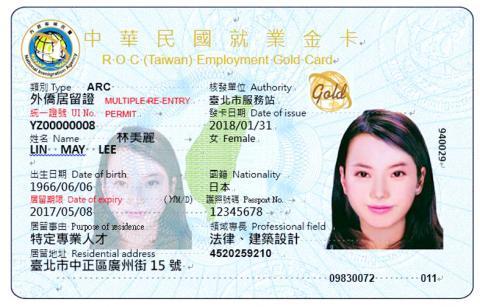The number of recipients of Taiwan’s employment gold card, a special work and residency permit for highly skilled foreign workers, surged last year, reflecting the nation’s attractiveness as a safe haven amid the COVID-19 pandemic.
Official figures showed that last year, 1,399 foreign nationals received the card that serves as a work permit, resident visa, alien resident certificate and re-entry permit.
That represented a sharp increase from 358 in 2019 and 188 in 2018, the year when the National Development Council launched the Employment Gold Card system to attract foreign professionals.

Screen grab from the Internet
The Gold Card system is open to foreign workers in the fields of science and technology, education, arts and culture, sports and economics, as specified in the Act for the Recruitment and Employment of Foreign Professionals (外國專業人才延攬及僱用法), which took effect on Feb. 8, 2018.
It has since been expanded to cover the fields of finance, architecture and law, said the Taiwan Gold Card Office, created by the council to serve as a single contact point to help foreign professionals with the process.
As of Jan. 31, a total of 2,127 gold cards had been issued to foreign professionals, including 1,468 people in the field of economics, 228 in technology, 164 in arts and culture, 132 in finance, 128 in education, six in architecture and one in sports.
“[I have] never seen so many people interested in coming to Taiwan,” Taiwanese-American start-up entrepreneur Dave Lu (呂曉龍) said in an interview last month.
A gold card holder himself, Lu moved his family from California to Taiwan last year. He has more than 20 years of experience working in technology, for companies such as Yahoo, Sony, Apple and eBay before joining start-up Pure Digital, which was later acquired by Cisco.
He is now the president and cofounder of Pared, a venture-backed restaurant labor market network.
Lu, who also founded Taiwan X, an organization that helps Taiwanese entrepreneurs, with YouTube cofounder Steve Chen (陳士駿), said that living in Taiwan allows him to connect Taiwan’s technology groups with those in the US.
However, there were several other reasons for his move to Taiwan, he said, including the serious COVID-19 outbreak and tense political environment in the US, and Taiwan’s safer and more stable environment that offers the increasingly rare commodity of “normality.”
Many people have come to Taiwan from around the world, including several without any connection to it, largely because of Taiwan’s “safety” and “normality,” Lu said.
Korean-American Danial Kang, who also moved to Taiwan from California last year, applied for a gold card in August and received it in late October.
The 28-year-old said that while many countries adopted lockdown measures to contain COVID-19 outbreaks, a friend of his living in Taiwan showed him photos of people gathering and dining normally at local restaurants.
He was yearning for that kind of “surreal normality,” Kang said, praising the Taiwanese government for taking effective measures in response to the pandemic, and Taiwanese for being highly self-disciplined and alert in facing the challenge.
An environment in which people can live and work without having to worry about outbreaks of disease is “very attractive,” he said.
Beyond gold card holders, Taiwan also saw a surge in the number of white-collar foreign workers last year.
There where 36,987 foreign white-collar workers in Taiwan as of Nov. 30 last year, nearly 6,000, or 18.8 percent, more than at the end of 2019 before the pandemic started, Ministry of Labor statistics showed.

The Grand Hotel Taipei on Saturday confirmed that its information system had been illegally accessed and expressed its deepest apologies for the concern it has caused its customers, adding that the issue is being investigated by the Ministry of Justice Investigation Bureau. The hotel said that on Tuesday last week, it had discovered an external illegal intrusion into its information system. An initial digital forensic investigation confirmed that parts of the system had been accessed, it said, adding that the possibility that some customer data were stolen and leaked could not be ruled out. The actual scope and content of the affected data

‘LIKE-MINDED PARTNER’: Tako van Popta said it would be inappropriate to delay signing the deal with Taiwan because of China, adding he would promote the issue Canadian senators have stressed Taiwan’s importance for international trade and expressed enthusiasm for ensuring the Taiwan-Canada trade cooperation framework agreement is implemented this year. Representative to Canada Harry Tseng (曾厚仁) in an interview with the Central News Agency (CNA) said he was increasingly uneasy about Ottawa’s delays in signing the agreement, especially as Ottawa has warmed toward Beijing. There are “no negotiations left. Not only [is it] initialed, we have three versions of the text ready: English, French and Mandarin,” Tseng said. “That tells you how close we are to the final signature.” Tseng said that he hoped Canadian Prime Minister Mark Carney

President William Lai (賴清德) yesterday bestowed one of Taiwan’s highest honors on Saint Vincent and the Grenadines (SVG) Ambassador Andrea Clare Bowman in recognition of her contributions to bilateral ties. “By conferring the Order of Brilliant Star with Grand Cordon on Ambassador Bowman today, I want to sincerely thank her, on behalf of the Taiwanese people, for her outstanding contribution to deepening diplomatic ties between Taiwan and SVG,” Lai said at a ceremony held at the Presidential Office in Taipei. He noted that Bowman became SVG’s first ambassador to Taiwan in 2019 and

A man walks past elementary school artworks at the Taipei Lantern Festival in Ximen District yesterday, the first day of the event. The festival is to run from 5pm to 10pm through March 15.